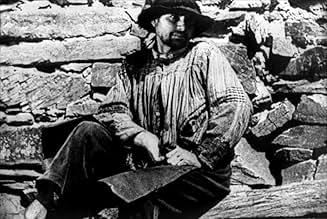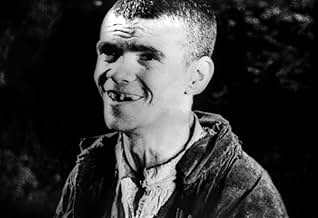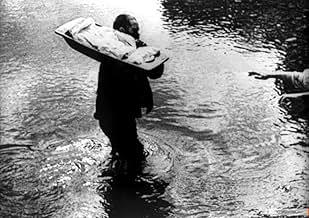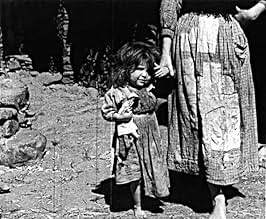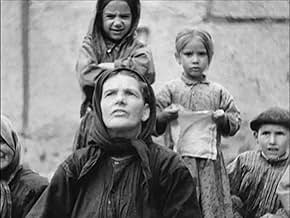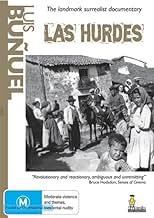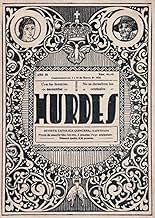Las Hurdes
- 1933
- 30m
ÉVALUATION IMDb
7,3/10
6,5 k
MA NOTE
Ajouter une intrigue dans votre langueA surrealist film, a pseudo-documentary portrait of Las Hurdes, a remote region of Spain where civilisation has barely developed, showing how the local peasants try to survive without even t... Tout lireA surrealist film, a pseudo-documentary portrait of Las Hurdes, a remote region of Spain where civilisation has barely developed, showing how the local peasants try to survive without even the most basic utilities and skills.A surrealist film, a pseudo-documentary portrait of Las Hurdes, a remote region of Spain where civilisation has barely developed, showing how the local peasants try to survive without even the most basic utilities and skills.
- Director
- Writers
- Stars
Avis en vedette
I have been frustrated by the version of the film that is available in my area, entitled "Unpromised Land". The original "Tierra sin Pan" has a completely different commentary which is made "politically correct" in the "Unpromised" version. Avoid "Unpromised Land" as it censors and alters the original intent of the film as conceived by Bunuel!
10groveman
I found it very interesting reading the reactions of others here, from interpreting this as everything from a pure comedy to a pure documentary. The truth is that it denies classification, and for many that just simply does not compute. Therefore, it has obviously done exactly what Bunuel wanted.
The aim of surrealism is to lure you in with the trap of a conventional narrative, and then hit you right in the face with something impossible to just passively accept. This film is the perfect example of this. You are absolutely forced into the role of active observer; forced to draw your own conclusions. Independent thought is pulled to the surface, returning comprehension to it's original purity. Reality lies not in what you are seeing, and not in what you are hearing, but somewhere in-between.
My God, this man was a genius, and so far ahead of his time it's unbelievable. Spielberg shows you what you want to see. Bunuel shows you what you need to see. Find this film and see it. Its value is incalculable.
The aim of surrealism is to lure you in with the trap of a conventional narrative, and then hit you right in the face with something impossible to just passively accept. This film is the perfect example of this. You are absolutely forced into the role of active observer; forced to draw your own conclusions. Independent thought is pulled to the surface, returning comprehension to it's original purity. Reality lies not in what you are seeing, and not in what you are hearing, but somewhere in-between.
My God, this man was a genius, and so far ahead of his time it's unbelievable. Spielberg shows you what you want to see. Bunuel shows you what you need to see. Find this film and see it. Its value is incalculable.
I have ancestors from my father side who are originally from Las Hurdes. The highlands were exactly like the documentary film portrays them. The lowlands slightly better off, The documentary helped them because the world focused on them and offered some help. Finally a cementery was built and food imported. Problem is the civil war that followed shortly afterwards. Buñuel was a surrealist film director who tried to shift towards realism after joining the communist party. The civil war against communists and fascists further increased poverty but no films were allowed for decades under the dictatorship 1936-1975
Bunuel had always been a visionary man,his cinema had never stopped trying from "un chien andalou" to "le fantôme de la liberté"."las Hurdes " was a documentary ,but it made the genre explode.And,to think it was seventy years ago!
Near the Portuguese border,there's a part of Spain where a doomed humanity used to live.The beginning of "las hurdes" deals with a feast in a village,last stop before the Hurdes country.
Then Bunuel begins his unthinkable depiction of this subhumanity:morons,maimed persons,monsters with twelve fingers,living in a filth you could not imagine.They drink in the brook/sewer!Springtime which everybody enjoys elsewhere is the worst season for the "Hurdes":all that remains for them to eat is cherries.But they cannot wait that they ripen,so they contract dysentery and they fall like flies.
And ,however,in a world that God seems to have completely forgotten,the children learn at school that the sum of the angles of a triangle is 180 degrees.And chiefly,they must respect the property of others(!). On the wall of the classroom,you can see a picture,showing an eighteen century marchioness!
Irony and surrealism are always here .After these horrors,out of the blue,Bunuel begins a lecture on the anopheles mosquito,complete with anatomical charts.
Banned by the Spanish government in 1933-1935,it took the Popular front(1936)to release what was the first social and political documentary.
Near the Portuguese border,there's a part of Spain where a doomed humanity used to live.The beginning of "las hurdes" deals with a feast in a village,last stop before the Hurdes country.
Then Bunuel begins his unthinkable depiction of this subhumanity:morons,maimed persons,monsters with twelve fingers,living in a filth you could not imagine.They drink in the brook/sewer!Springtime which everybody enjoys elsewhere is the worst season for the "Hurdes":all that remains for them to eat is cherries.But they cannot wait that they ripen,so they contract dysentery and they fall like flies.
And ,however,in a world that God seems to have completely forgotten,the children learn at school that the sum of the angles of a triangle is 180 degrees.And chiefly,they must respect the property of others(!). On the wall of the classroom,you can see a picture,showing an eighteen century marchioness!
Irony and surrealism are always here .After these horrors,out of the blue,Bunuel begins a lecture on the anopheles mosquito,complete with anatomical charts.
Banned by the Spanish government in 1933-1935,it took the Popular front(1936)to release what was the first social and political documentary.
"Las Hurdes" may be the Surrealist documentary par excellence, a tendentious film discourse about poverty shot in Las Hurdes Altas, a human settlement out of a nightmare, among steep precipices, in an almost deserted landscape. Even based on Maurice Legendre's 1927 anthropological text "Las Jurdes: A Study of Human Geography", Buñuel forced into the harsh situations his own obsessions with insects and donkeys that would appall today any society for the protection of animals. Done at a time when Spain was among the nine countries with the highest level of economic development, by contrast this work shows the state of misery of a community marginalized by landowners, forgotten by authorities, and living in the cruelest of conditions. The cynic commentary makes the facts more striking, but the music score by Darius Milhaud is an obtrusive element. Although banned by the authorities, it was re-released with a Spanish narration read by actor Francisco Rabal.
Le saviez-vous
- AnecdotesLuis Buñuel was not above slaughtering several animals to deliver his message; he ordered the ailing donkey to be spread with honey so he could film it being stung to death by bees. Nor was the mountain goat falling off the mountain an accident, shot by Buñuel's crew for the desired sequence.
- GaffesIn the sequence where the mountain goat falls to its death, a puff of smoke can be seen on the side of the screen. This is from a gunshot by a crew member, who shot the goat so that it would fall and be filmed as if it 'accidentally' fell off of the mountain.
- ConnexionsFeatured in Histoire(s) du cinéma: Les signes parmi nous (1999)
Meilleurs choix
Connectez-vous pour évaluer et surveiller les recommandations personnalisées
Détails
- Date de sortie
- Pays d’origine
- Langue
- Aussi connu sous le nom de
- Land Without Bread
- Lieux de tournage
- La Alberca, Salamanca, Castilla y León, Espagne(main town, on location)
- société de production
- Consultez plus de crédits d'entreprise sur IMDbPro
- Durée
- 30m
- Couleur
- Mixage
- Rapport de forme
- 1.37 : 1
Contribuer à cette page
Suggérer une modification ou ajouter du contenu manquant

